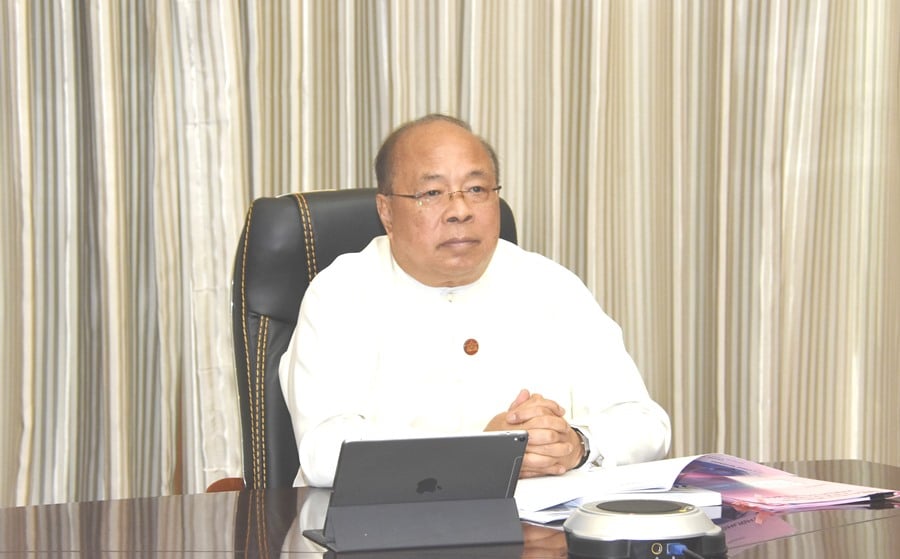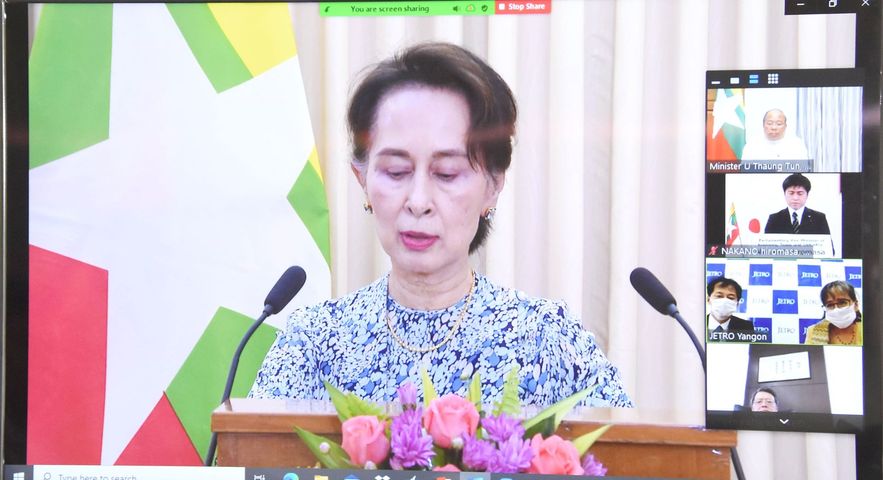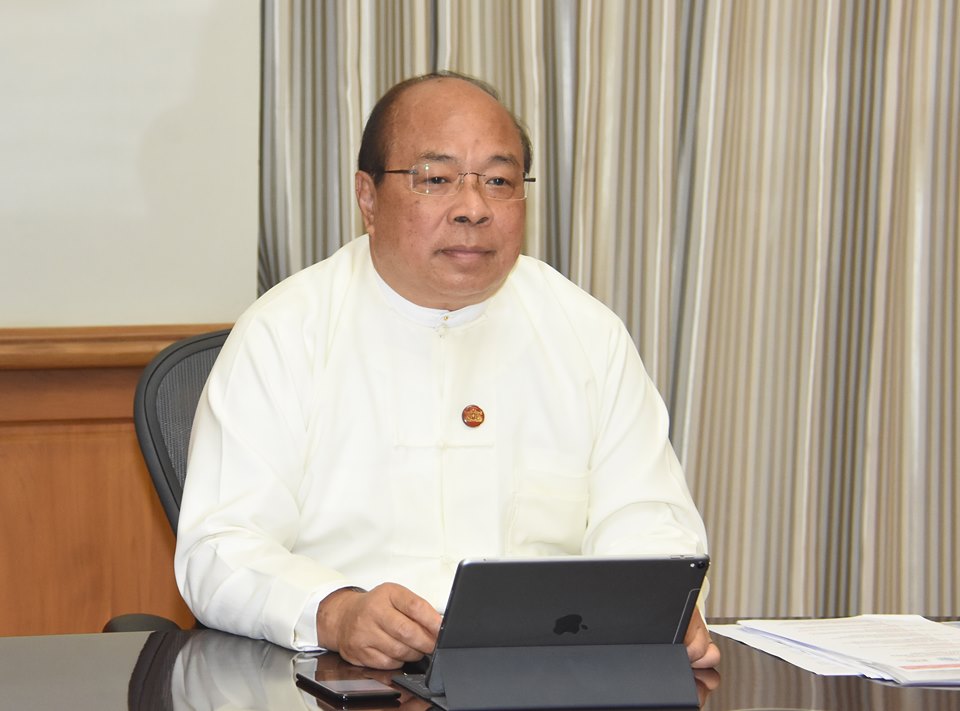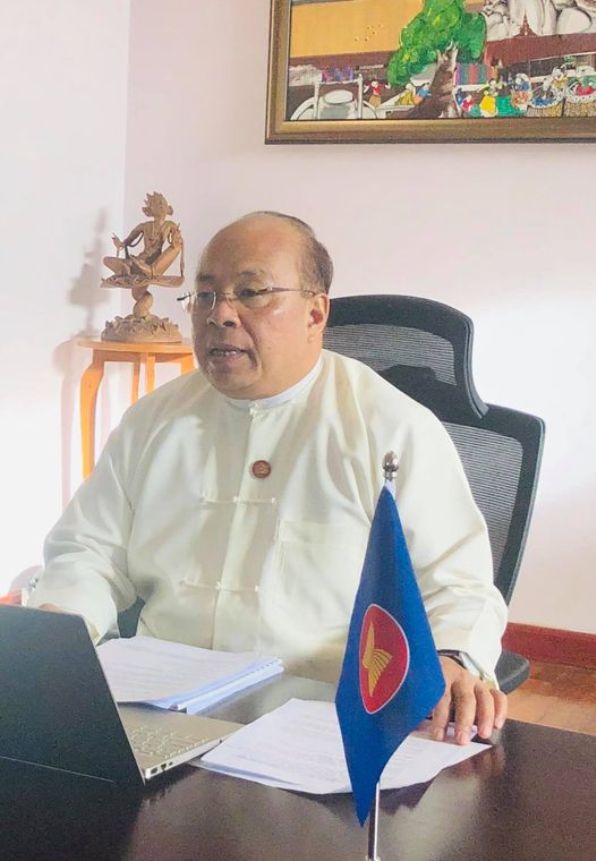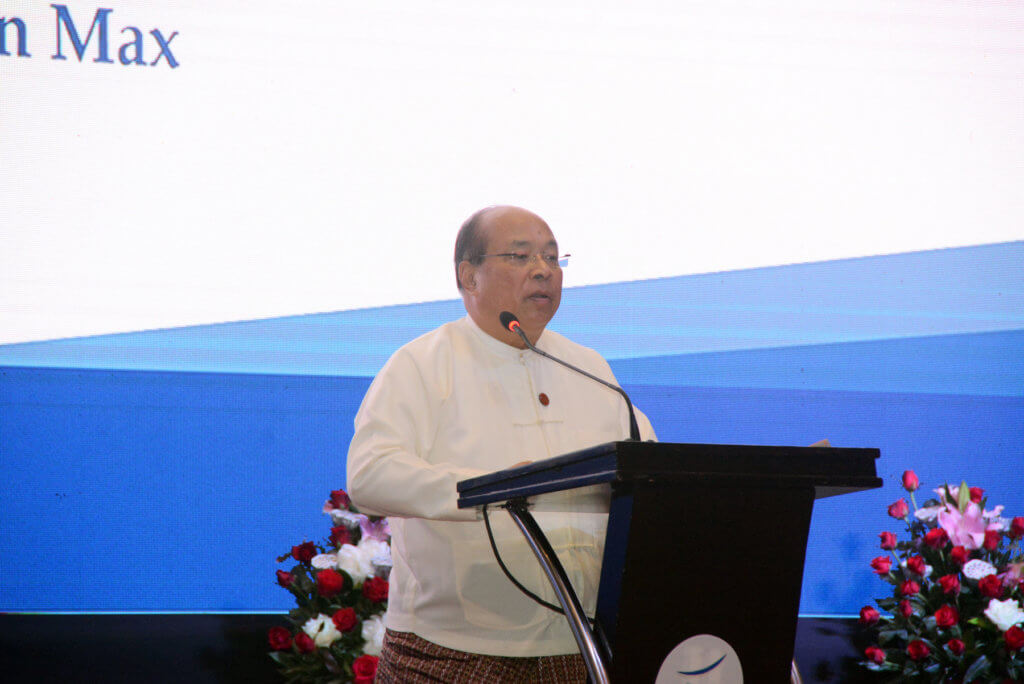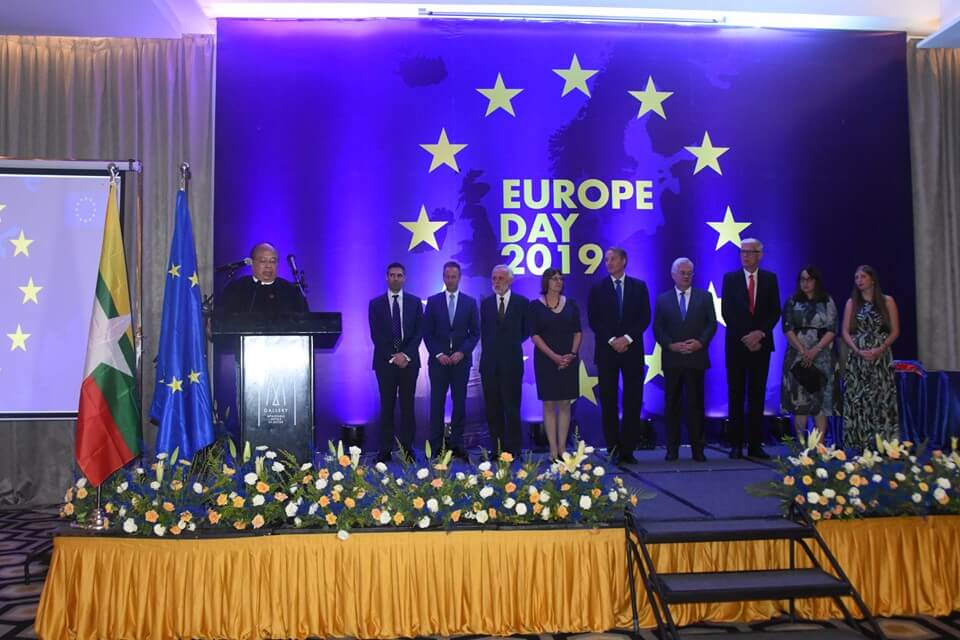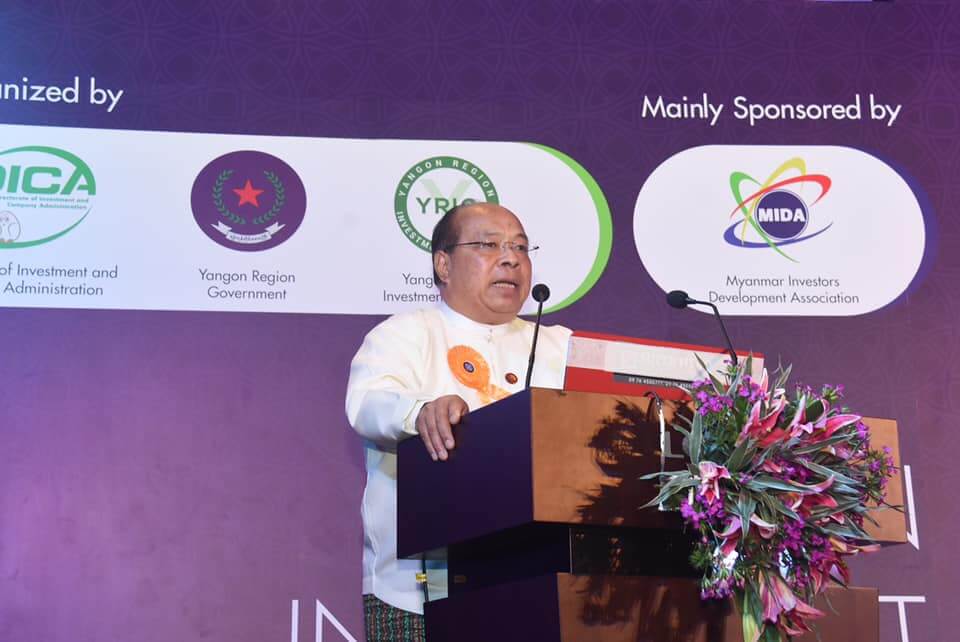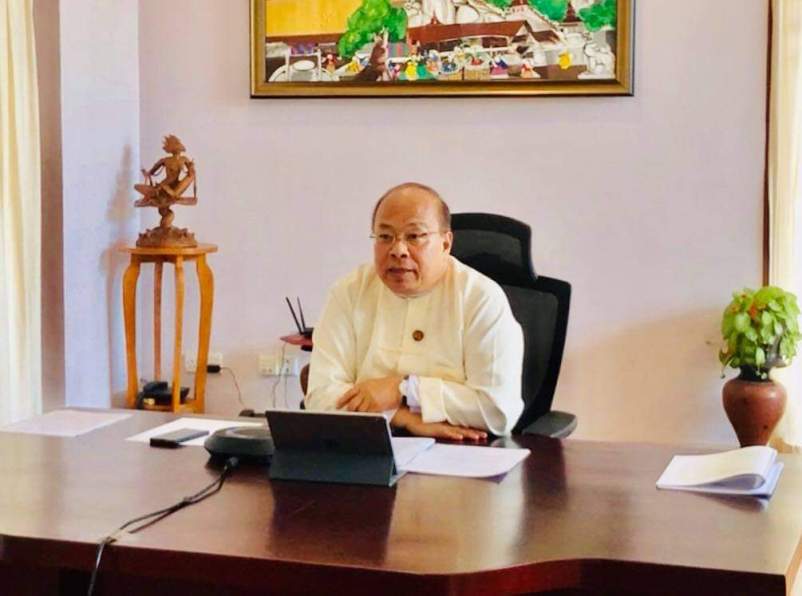

H.E. U Thaung Tun
Union Minister for Investment and Foreign Economic Relations
KEYNOTE ADDRESS
at AustCham Myanmmar Webniar
16 October 2020
Thank you to Chris, and the team at AustCham Myanmar. Thanks also to Nicolas and the EuroCham team for pulling together today’s event.
AustCham and EuroCham are no strangers to us. You are at the forefront of public-private dialogue initiatives here in Myanmar – building bridges and doing an outstanding job representing your business communities.
Ladies and Gentlemen:
Thank you for the invitation to participate in today’s event – an event as timely as it is important.
I believe, occasions such as these provide excellent opportunities to cut through the noise. They provide me with an opportunity to speak directly to the business community, but just as importantly, they provide us here in Nay Pyi Taw with an opportunity to listen to you.
I would also like to thank all who have turned out today to hear me say a few words, provide a few observations and perhaps even proffer an insight or two!
I can see the two Chambers have assembled a stellar line-up today, so before I begin my remarks, let me extend a warm welcome to our panelists:
- Professor Sean Turnell – Your long-term engagement and nuanced understanding of Myanmar, combined with your boundless enthusiasm is always welcome. Good to see you Sean!
- Ms Michelle Grady – It’s Wonderful to see you! As Country Manager of Woodside Energy, Michelle is responsible for one of the largest offshore petroleum acreage holdings in Myanmar. We very much look forward to seeing your fourth drilling campaign commence as soon as possible. Good luck on your A-6 project.
- Ms Rebecca Mohr – A warm welcome to you. If any require convincing that Myanmar’s retail sector holds tremendous potential, look no further than City Holdings – a market leader in Myanmar and an icon in the country’s retail industry!
- Mr Ben Koo – Good afternoon sir. As the leading mobile financial services provider in Myanmar, Yoma Strategic Holdings, via the Wave Money joint venture, has proven invaluable. I am on record stating that Myanmar must make quantum leaps into the 21st century, and I believe that Yoma Strategic Holdings, through Wave Money and other initiatives, are helping us achieve exactly that.
- U Alex Nyi Nyi Aung of Unilever – Welcome my friend. As a fellow Twitter aficionado, let me say that you are doing an excellent job promoting Myanmar as an investment destination of choice! Let me also congratulate Unilever on recently being recognised as one of Myanmar’s top 20 employers, while noting the lifesaving work that Unilever is doing, together with the UNHCR, promoting health and hygiene for families in need in the context of COVID-19.
And last but not least, let me welcome Mr Thomas Kean, Editor-in-Chief of Frontier Myanmar. With a recent spate of awards for journalistic excellence, Frontier consistently produces some of the best quality print journalism our region has to offer. While we may not agree on every issue, I do believe quality journalism begets a well-informed citizenry, and that both are essential to the democratic process. So, thank you.
I’ve been asked to say a few words on what the future may have in store for Myanmar’s business community. I will surely attempt to do so, but I also think it would be most appropriate to spend a few minutes first putting thing in context.
I hope that’s alright with everyone.
On the 30th January this year, the Director-General of the World Health Organization declared the outbreak of COVID-19 to be a Public health emergency of international concern.
That same day, State Counsellor Daw Aung San Suu Kyi established a Committee responsible for mobilising the full resources of the Union government to defend against this new strain of the coronavirus.
41 days later, on the 11th of March 2020, the WHO declared COVID-19 a global pandemic.
The State Counsellor moved immediately – upgrading the Committee to a National Level Central Committee for the Prevention, Control and Treatment of COVID-19. On that occasion, the Government also established a Working Committee to Mitigate the Economic Impact of COVID-19 on Myanmar’s Economy – the Committee which I now serve as Chair.
Our Committee moved equally quickly – within days we established a COVID-19 Relief Fund within the Myanmar Economic Bank. With an initial tranche of 100 billion Kyat, we began disbursing low-interest loans earmarked for our nation’s MSMEs deemed most vulnerable to COVID-19. Within just weeks, we had disbursed the entire Fund to nearly 4,000 enterprises in our tourism and garment manufacturing sectors. Learning from this experience, we topped up the fund with an additional tranche of K100 billion.
At the same time, we took measures to meet the challenge posed by COVID-19. For the first time in living memory, traditional festivals such as Thingyan was cancelled. Stay-at-home orders were instituted. Food distribution drives were mobilised, and electricity subsidies provided to help ease holidays.
And yet, with much regret and despite our best intentions, we could not ward off the inevitable. On the 23rd of March 2020, we reported our first COVID-19 positive case.
Once again, the government acted quickly – a few weeks later releasing our ‘Together as One’ COVID-19 Economic Relief Plan (CERP) aimed at mitigating the economic impact posed by COVID-19, while balancing the needs of all stakeholders, and leaving no-one behind.
Leaving. No-one. Behind.
In August the Working Committee successfully initiated a 2nd tranche low-interest loans – this time in support of our agriculture sector. Whereas the 1st tranche was disbursed via the MEB, this 2nd tranche was channeled through both public and private banks. I believe that by the end of next week the 2nd tranche will have been well disbursed.
In keeping with the CERP, 600 billion Kyat have been disbursed to farmers via the MADB and Interest-free loans have been made available to some 1 million civil servants. The Natural Disaster Management Fund has been continuously topped up. Similarly, almost 530 kyat billion in sector-level support has been extended to health, construction, and social welfare sectors.
The Ministry of Agriculture, Livestock and Irrigation has also been hard at work, earmarking over US$50 million in cash-for-work and cash-for-lending programmes – benefitting over 120,000 households now employed in the construction of community-level infrastructure, and with small-scale loans distributed across over 1,700 villages.
I also note the support extended via our development partners, many of whom have joined us at today’s event.
The highly respected LIFT Fund, together with the Ministry of Social Welfare, Relief and Resettlement, have provided cash transfers to over 175,000 pensioners and close to 250,000 pregnant women and children.
The EU-funded ‘Myan Ku’ Fund has provided over 5.4 billion Kyat in cash support payments to over 70,000 garment and footwear factory workers. Notably, 100% of this cash support assistance was transferred using the Wave Money platform.
We have also seen the fast-tracking of concessional financing approvals from the IMF, the World Bank, and JICA – helping us to weather the storm and steer us through these difficult times. Indeed, just this week the ADB approved a US$30 million loan to expand assistance to vulnerable groups with inadequate access to health care and other essential services.
In sum, we calculate that the government has thus far mobilised over 4 trillion Kyat in fiscal stimulus measures – i.e. around 3.4% of Gross Domestic Product.
Despite constraints and limited resources, this figure is in keeping with emerging market and developing economy averages – and is set to increase.
Ladies and Gentlemen:
We have many challenges. Of that, there can be no doubt. But there have also been major successes – some may even call them “silver linings”.
Oxfam this month reported that Myanmar has used the COVID-19 crisis as an impetus to increase social protection coverage to 21 million people, an increase of some 8,684% via both one-off and ongoing support.
Today’s event, in many ways, demonstrates how this crisis has helped to further Myanmar’s embrace of digitalization and e-government services. Through technologies like Zoom, we are overcoming digital divides and coming closer together in the process.
Indeed, throughout the crisis, we’ve seen a range of government services transitioned online, including services aimed at strengthening our investment enabling environment.
One example can be seen in this year’s launch of a new online Yangon Building Permit System, streamlining procedures and reducing paperwork for those seeking construction permits. I am pleased to announce that in just six months since its launch, there have been more than 1,000 applications made.
We’ve also recently transitioned to an online tax payment system, now allowing Yangon-based firms to pay various forms of tax through a mobile payment system connected to banks such as CB and KBZ. Indeed, such was the excitement at seeing this system rolled out that I know of one participant with us today who is on the record as stating – and I quote – “I’ve never been so happy to pay tax as right now”.
Ladies and Gentlemen:
A third “silver lining” of interest to our business community can be seen in the more rapid evaluation and approval of responsible, FDI – not just via fast-track procedures – but also through a more competent, more efficient, and more responsive institutional framework established within MIFER and at the MIC.
In the fiscal year just passed, we were proud to have topped US$5.68 billion in FDI approvals – laying the foundation for as many as 100,000 thousand new, quality jobs – jobs that will play a major role in catalysing our economic recovery in the months and years ahead.
Indeed, despite challenging global, regional and domestic headwinds, Myanmar successfully attracted more than US$25 billion in FDI commitments, with the MIC and regional Investment Commissions granting well over 1,000 investment permits and endorsements to foreign enterprises over these past 4 years.
I can say with absolute confidence that our business community can expect to see a steady stream of similar investor- and business-friendly reforms rolled out over the coming year.
I can state confidently that MIFER, having secured a 37% increase in foreign investment approvals this past year – a feat many thought impossible – will continue to lead on a range of new endeavours, from a new Land Bank now under development, to systematic growth diagnoses aimed at identifying new growth drivers that will contribute to a more modern, more inclusive and more productive economy.
I can state confidently that MIFER will seek to develop more SEZs and new industrial zones transparently, in strategic areas and sectors, and in partnership with reputable, internationally experienced developers. We will also aim to modernise and expand fiscal incentives on offer under a revised Myanmar Investment Law and through a revised Myanmar Investment Promotion Plan.
We will continue taking bold steps to ensure that our investors can secure an even greater number of permits and approvals online, via single-digital-windows.
And this is just a small indication of what we have planned. Even as we speak, my team is conducting workshops considering these and other ambitious initiatives, and I look forward to providing further details in due course.
Ladies and Gentlemen:
It cannot be denied, we are now doing battle with a COVID-19 2nd wave. It offers cold comfort to know that we are not alone as much of the world faces a similarly daunting challenge.
Once again, our thoughts and prayers go to those fighting at the front – this includes our health workers, our nation’s civil servants, households and individuals.
Recognising the business community’s role in addressing both the health and economic impacts COVID-19, it is my wish, and that of the Working Committee, that we will continue to see a gradual opening up of our economy over the weeks ahead.
As you’ll be aware, this week we relaxed restrictions on factories and some businesses, permitting a gradual return to operations, despite movement restrictions in place.
The Ministry of Construction has also now permitted trucks to resume travel on the Yangon-Mandalay highway.
Construction projects in Yangon are also now being permitted to resume per new health regulations. And, authorities are now making arrangements for the operators of harvesters and other agriculture machinery to travel between districts together with their machines to better prepare for the coming harvesting season.
Ladies and Gentlemen:
Many have asked, ‘When can we expect to open up again?’. ‘When will we see a return to normal?’.
I have been asked this question since March. The simple answer is – until the public health problem is effectively managed, COVID-19 will continue to be an economic problem.
What I can say is that there will be a time where it is safe to open up again – when a simple cross-town trip to visit family or to a favourite restaurant will not place the lives of entire communities at risk. But now is not the time.
To re-open prematurely would be irresponsible – a slap to the face of our health workers and communities who have sacrificed so much for so long. This is not a sacrifice I am ready to ask of my fellow citizens.
What I am ready to do, is to listen and to act – in accordance with the guidance of our health experts and those present here today. What can be done to keep our economy moving without placing our people at unnecessary risk? What innovative measures might be applied?
Ladies and Gentlemen:
The IMF now forecasts Myanmar’s growth this year at 2%. While most forecasts suggest a rapid return to pre-crisis growth levels in 2021, we have a long way go to before we get there, and even then, it is no sure thing.
Of course, in monetary terms, the largest declines in growth will be witnessed in more developed countries, but it should come as no surprise that the greatest economic and social damage will be felt in poorer countries. Myanmar is no exception.
COVID-19 has had a devasting impact. We know that businesses and people are facing tremendous hardship. COVID has affected human health and reduced human capital and productivity, possibly for decades.
But the impact of COVID-19 also goes beyond job losses and incomes. In a COVID-19 world, the most vulnerable have become even more vulnerable. We can sense that inequality is on the rise. We know that people are being pushed back into poverty. I know we are all resolved to do all that we can. On behalf of MIFER, I am fully committed to doing all that I can.
Ladies and Gentlemen:
And, if we’ve learned anything from this crisis, it is that despite often arcane institutional machinery and limited public sector capacities, things can and do move quickly when there is political will.
We also know that short-term stimulus measures must be complemented by longer-term policy reform.
Building upon a recent review of CERP implementation, our new Myanmar Economic Recovery and Reform Plan (MERRP) offers a comprehensive recovery plan that will help us continue the economic reform journey we began just over four years ago. This new Plan places a premium on macroeconomic and financial stability, highlights the continuing importance of agriculture, prioritises inclusive and sustainable growth, green investments in renewable energy, and green infrastructure, and improvements in infrastructure and connectivity, boosting our human capital by facilitating reverse migration – and articulates critical role we envision for our dynamic and entrepreneurial private sector.
Friends, the MERRP and the Action Plans proposed, and indeed, our longer-term MSDP represents the political will of this government in the strongest possible terms – a political will that, I am sure the next administration will continue to demonstrate.
We have shared a draft of the MERRP with our domestic and international private sector networks and have asked our partners in development to provide their feedback. The Foreign Economic Relations Department is currently compiling inputs and feedback and will soon have a revised draft finalised. Your inputs will prove invaluable in ensuring a sustainable, inclusive and environmentally conscious recovery – allowing us to build back better, and to get back on track to achieving our longer-term Myanmar Sustainable Development Plan.
Ladies and Gentlemen:
In many ways, COVID-19 has provided yet another significant turning point for Myanmar.
We’ve had many in recent years.
It is said that future generations will judge today’s leaders on their ability to respond to the direct and indict crises associated with COVID-19.
For Myanmar, we need not wait that long.
But goodwill is not in endless supply.
Myanmar will continue to pursue COVID-19 relief and recovery efforts – having mobilised our whole-of-nation approach – pursued with a common purpose.
And to those amongst you willing to partner with us, we look forward to working with you.
Thank you.



